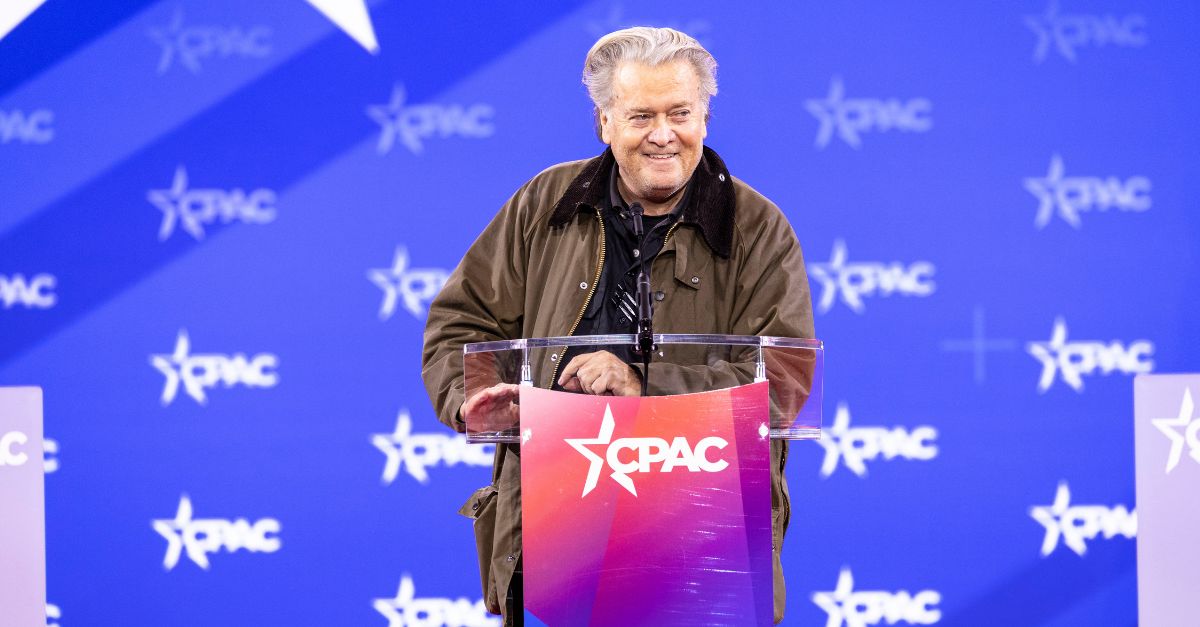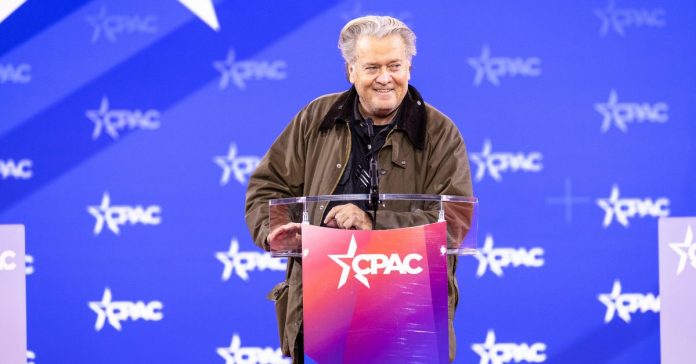
NATIONAL HARBOR, MD, USA — February 20 2025: Steve Bannon speaks on day 1 of the 2025 Conservative Political Action Conference (Photo by Joshua Sukoff/Medill News Service/Sipa USA)(Sipa via AP Images).
Former Trump White House chief strategist Steve Bannon once again lost a bid for judicial relief from his contempt of Congress convictions.
But the decision was a close call.
On Tuesday, the U.S. Court of Appeals for the District of Columbia Circuit issued a per curiam ruling against granting en banc review of Bannon’s two July 2022 convictions — which came after he flouted subpoenas issued by the since-defunct House Select Committee to Investigate the Jan. 6 Attack on the U.S. Capitol.
The loss is the latest in a long line of frustrated efforts.
After his conviction by a jury, Bannon was sentenced to four months in prison in October 2022. At first, U.S. District Judge Carl Nichols, who was appointed by President Donald Trump during his first term, gave Bannon a substantial amount of latitude — allowing him to remain free as he appealed his sentence and conviction.
Over the course of nearly two years, all relevant levers of the judicial system were pulled — from the D.C. Court of Appeals to the U.S. Supreme Court. But each time, Bannon’s appeals were rebuffed. Between the appellate and high court’s rejection, Nichols pointedly mused Bannon was simply not likely to succeed, and the judge obliged the government’s request to revoke his bail in June 2024.
Again, the process played out — as Bannon tried to stay out of prison, with no luck, and then to receive early release, to no avail.
Still, even now, Bannon takes issue with the way his prosecution — and subsequent conviction — occurred and aims to vindicate his rights.
The heart of Bannon’s efforts rests on the idea that bad precedent was used in his case to hamstring his defense. This precedent, the 1961 D.C. Circuit case of Licavoli v. United States, stands for the proposition that an advice of counsel defense is simply not available to a defendant facing a contempt of Congress charge.
Bannon claims his defiance of subpoenas was not simply to frustrate investigators but because the requests implicated executive privilege — and that his lawyer, in turn, instructed him to wait for a higher court’s ruling on those privilege issues before responding.
Delving deeper into the precedent, the Licavoli case interpreted the word “willfully” in the contempt of Congress statute to mean a “deliberate intention” not to appear — whereas beforehand the word arguably meant an intention to act with bad faith not to appear.
While the appeals court again rejected the argument this week, three members of the court voted in favor of overturning the Licavoli case.
U.S. Circuit Judge Neomi Rao, also appointed by Trump during his first term, penned the lengthy dissenting statement — which was joined in full by U.S. Circuit Judge Justin Walker, another Trump appointee. One section of the dissent specifically dealing with the precedent was joined by U.S. Circuit Judge Karen L Henderson, who was appointed by George H.W. Bush.
“I would grant rehearing en banc to overrule Licavoli,” Rao writes. “Consistent with Supreme Court precedent, the best reading of [the contempt of Congress statute] is that a defendant willfully defaults on a congressional subpoena only when he knows his default is unlawful. If the district court had applied this interpretation, the government would have been required to prove Bannon had the requisite knowledge of wrongdoing, and Bannon would have been entitled to present evidence that he lacked such knowledge because he believed, in good faith, that the House sought information protected by executive privilege. Because the government was not required to prove all the elements of [the statute], Bannon’s convictions must be reversed.”
To hear Rao tell it, a “text and structure” analysis requires the minority’s understanding of “willfully” because of how the two separate offenses in the contempt of Congress statute are worded.
The statute reads, in relevant part:
Every person who having been summoned as a witness by the authority of either House of Congress to give testimony or to produce papers … willfully makes default, or who, having appeared, refuses to answer any question pertinent to the question under inquiry, shall be deemed guilty of a misdemeanor.
In the statute, the first crime requires willful conduct not to cooperate; the second crime only requires refusal to cooperate under certain circumstances. Rao, applying a canon of construction, says this “variation” — one crime requiring a mental state; one crime requiring only action — is “meaningful” because when Congress “uses a term in one place and omits it in another, the choice is intentional.”
Additionally, the dissent notes that Supreme Court precedent has explicitly defined the second crime in the contempt statute — saying there is no requirement of “bad purpose or evil intent.” The logical upshot here, Rao insists, is the first crime — the crime Bannon was convicted of — necessarily does require such intent.
The dissent goes on, at length:
Under the best interpretation of [the contempt of Congress statute], the government must prove an individual defaulted on a congressional subpoena willfully, that is, with knowledge that his conduct was unlawful. Licavoli cannot be reconciled with the text or structure of [the statute], and the decision runs counter to the overwhelming weight of Supreme Court precedent. Licavoli should be overruled.
One member of the court, U.S. Circuit Judge Gregory G. Katsas, another Trump appointee, voted to respect the denial but wrote separately to suggest his strong misgivings with Licavoli. Still, Katsas said, overturning the decades-old case should be left to the Supreme Court.
In the majority, four members of the court issued a concurring statement arguing in favor of keeping Licavoli as controlling precedent.
Penned by U.S. Circuit Judge Bradley N. Garcia, a Joe Biden appointee, the concurrence takes issue with Bannon’s argument by citing late Supreme Court Justice Antonin Scalia in service of an argument that “willful” can sometimes simply mean a deliberate, as opposed to an accidental, act.
“There are any number of reasons a subpoenaed witness might unintentionally fail to appear and thus ‘default’—’illness, travel trouble, [or] misunderstanding,’ to name a few,” Garcia writes. “Without the ‘willfully’ qualifier, the statute could have been read to criminalize those defaults too.”
This understanding, the concurrence argues, comports more with the contempt statute’s purpose.
“Bannon has not tenably explained why Congress would pass a law that encourages less-cooperative conduct,” the majority writes. “His reading is especially perplexing given that the purpose of the contempt-of-Congress statute is to facilitate congressional inquiry.”

